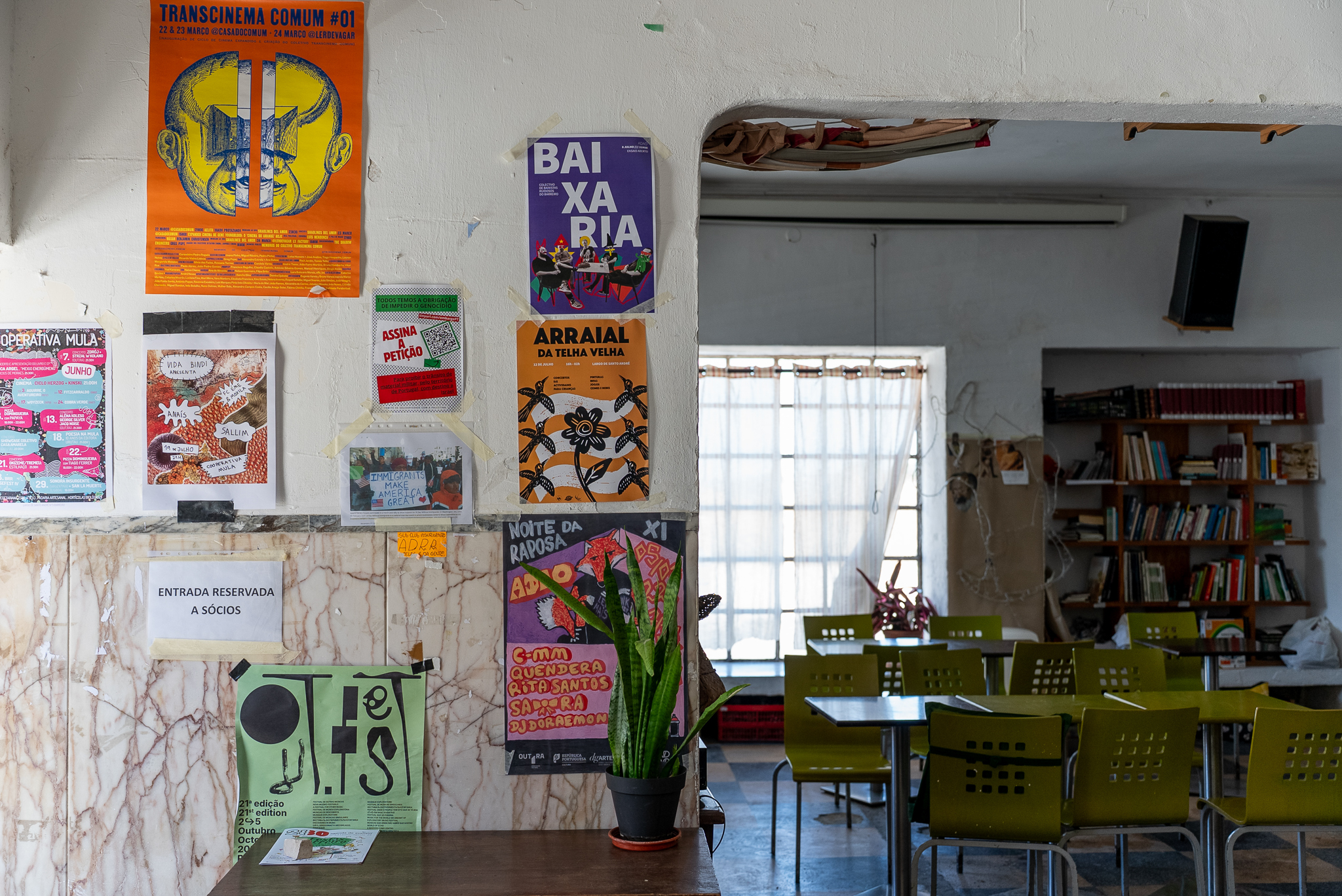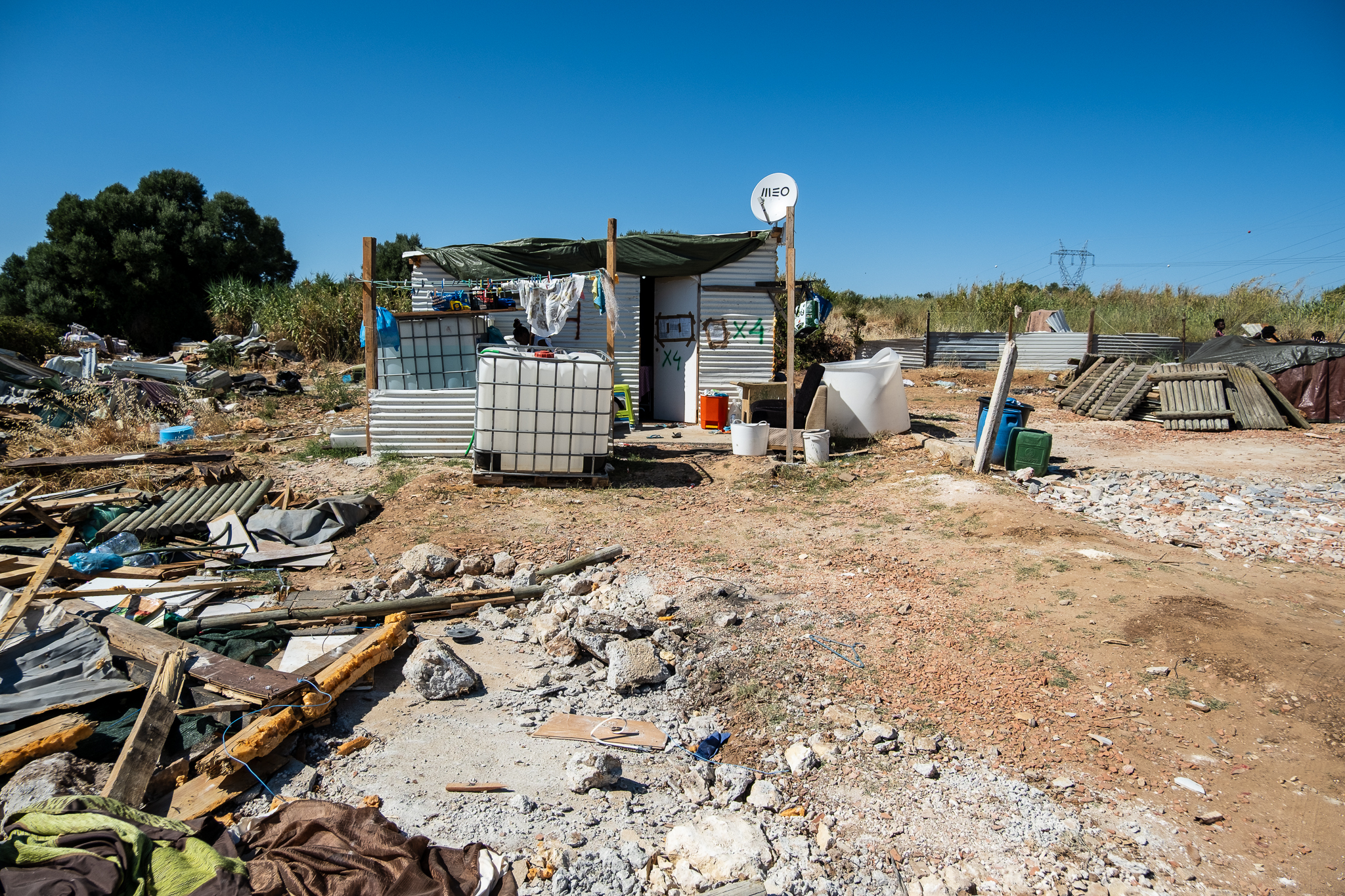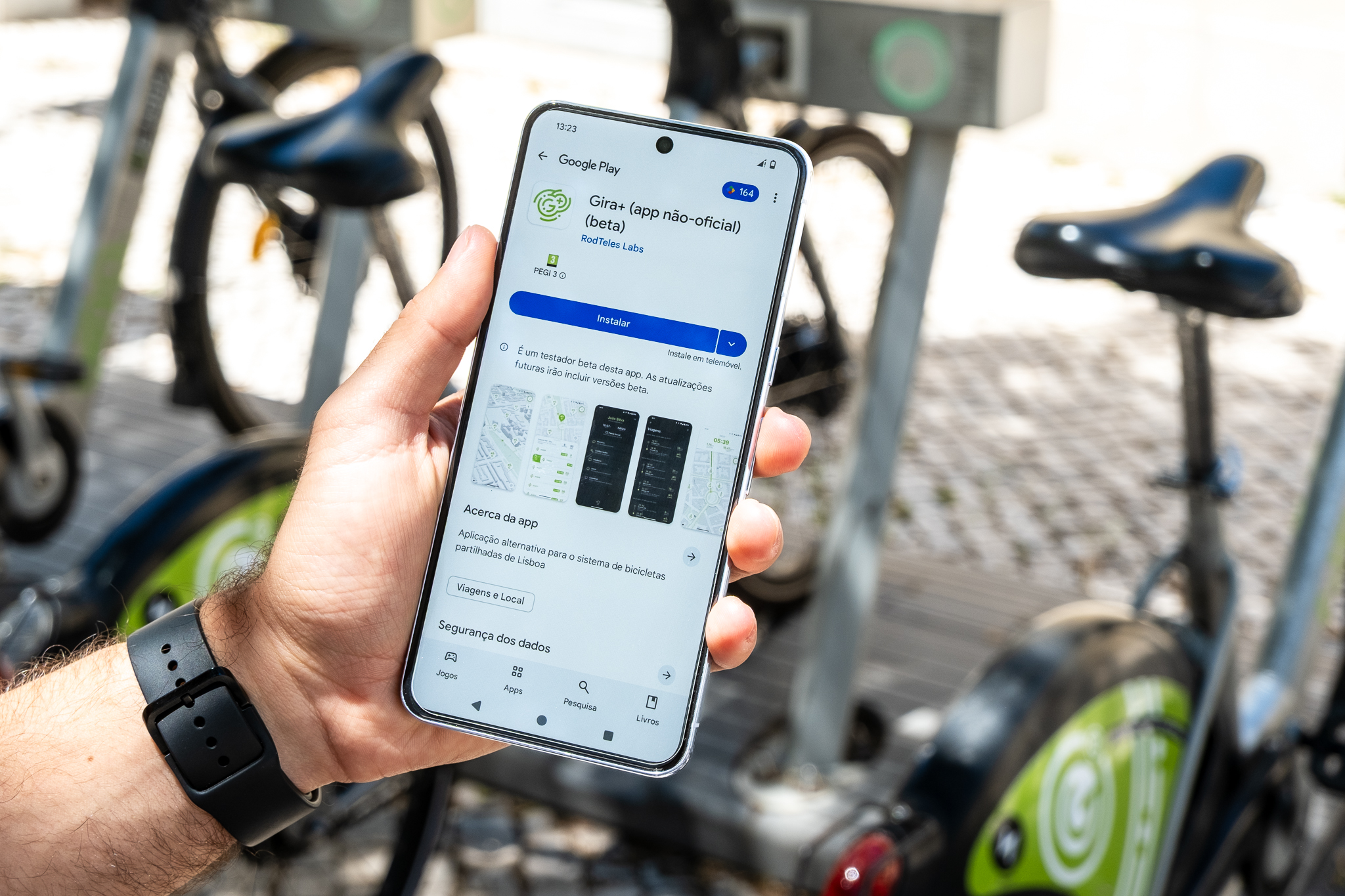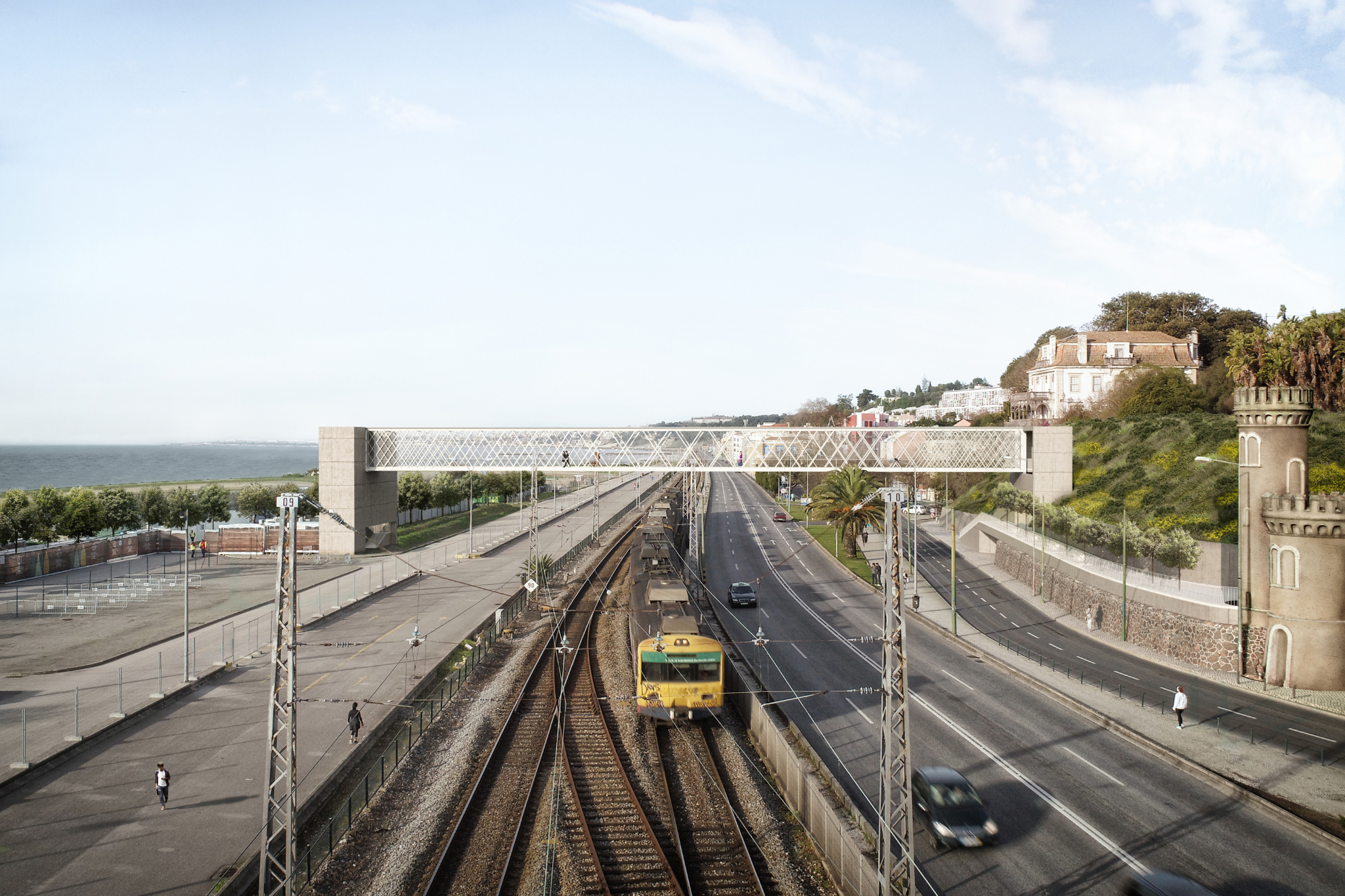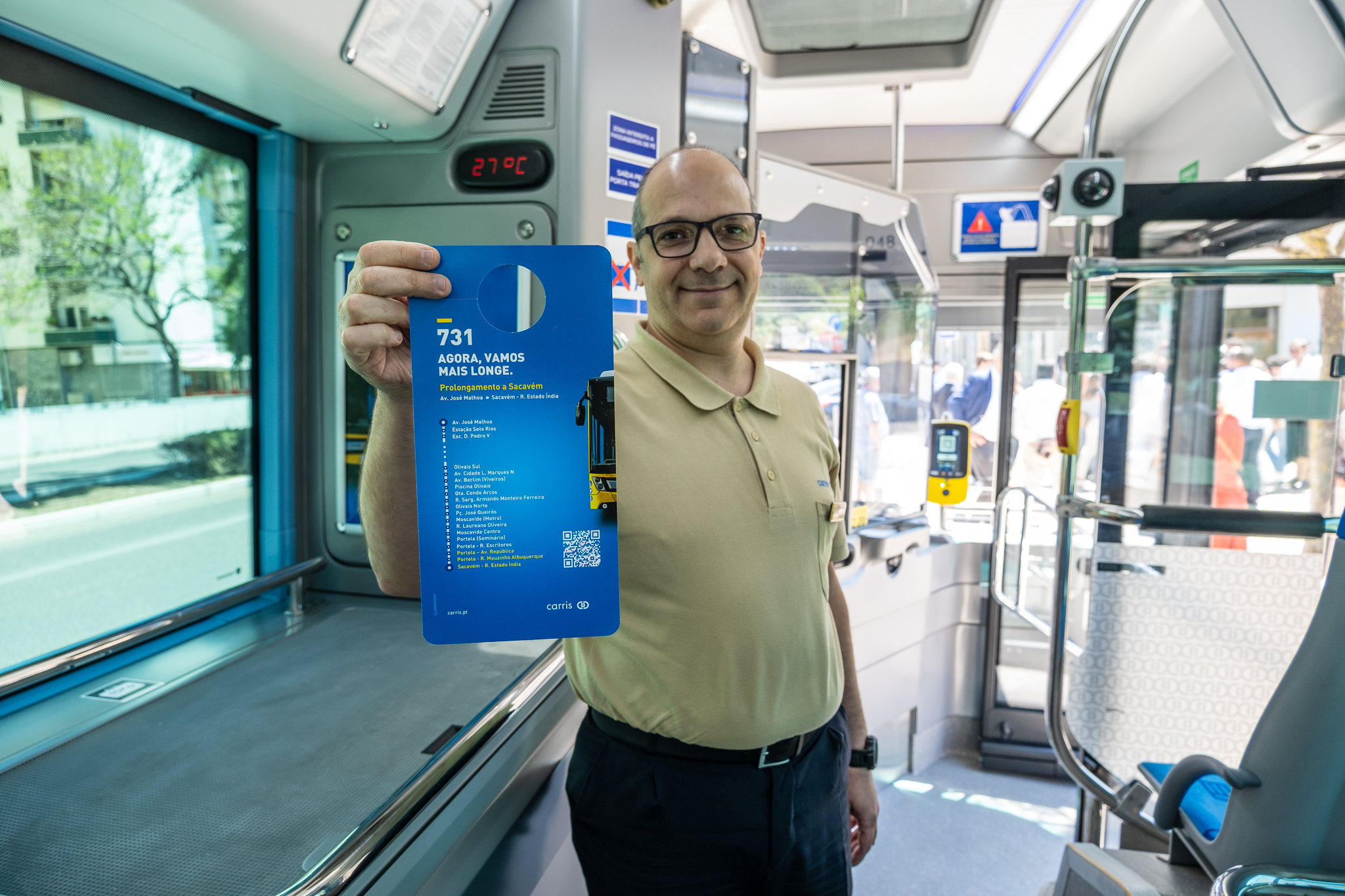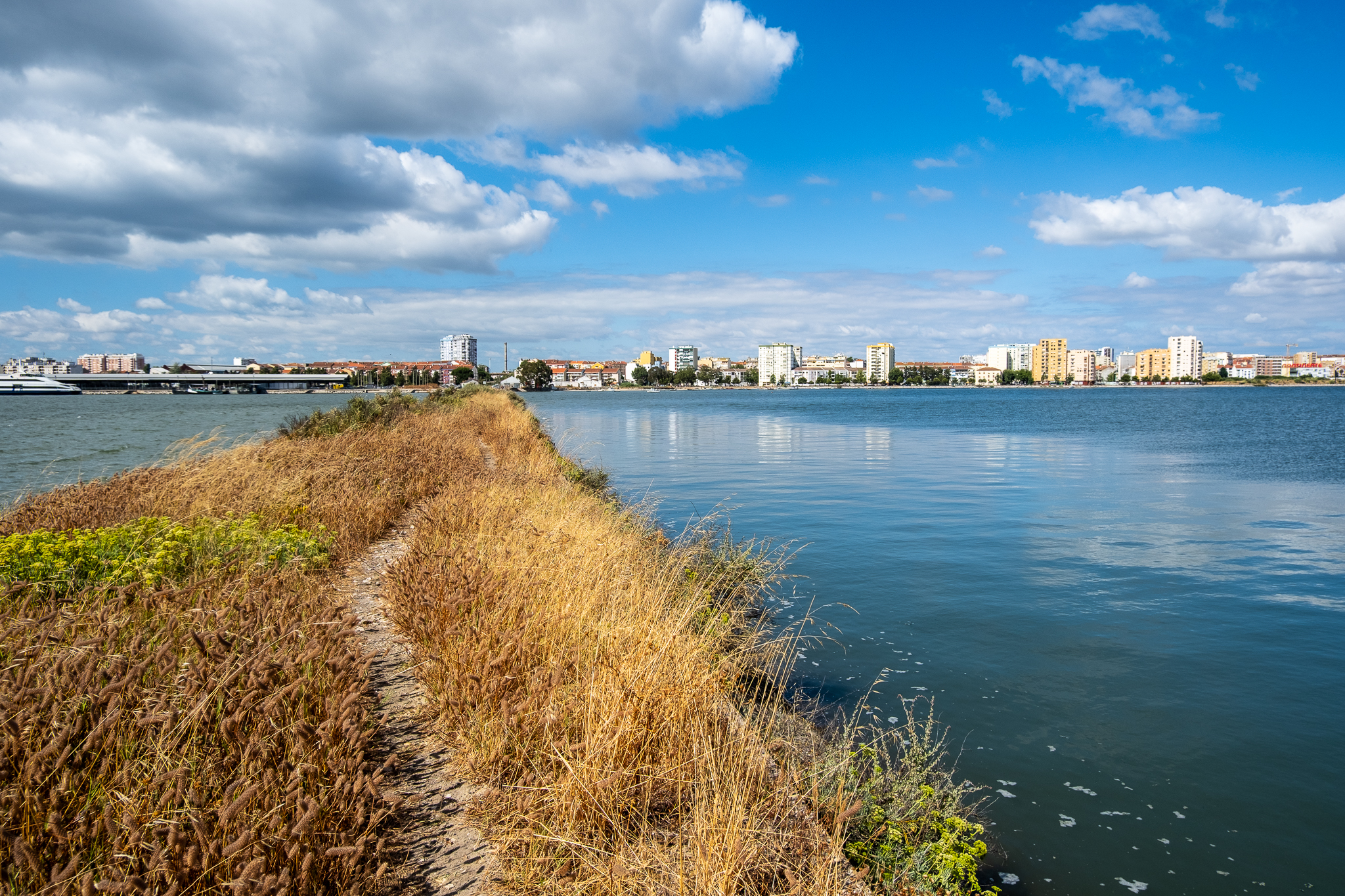Next Sunday, Benfica will choose between parking regulated by EMEL and the maintenance of the current paradigm. An issue that divides the city and also this parish, where more than 30 thousand people live. We talked to both sides of the issue.
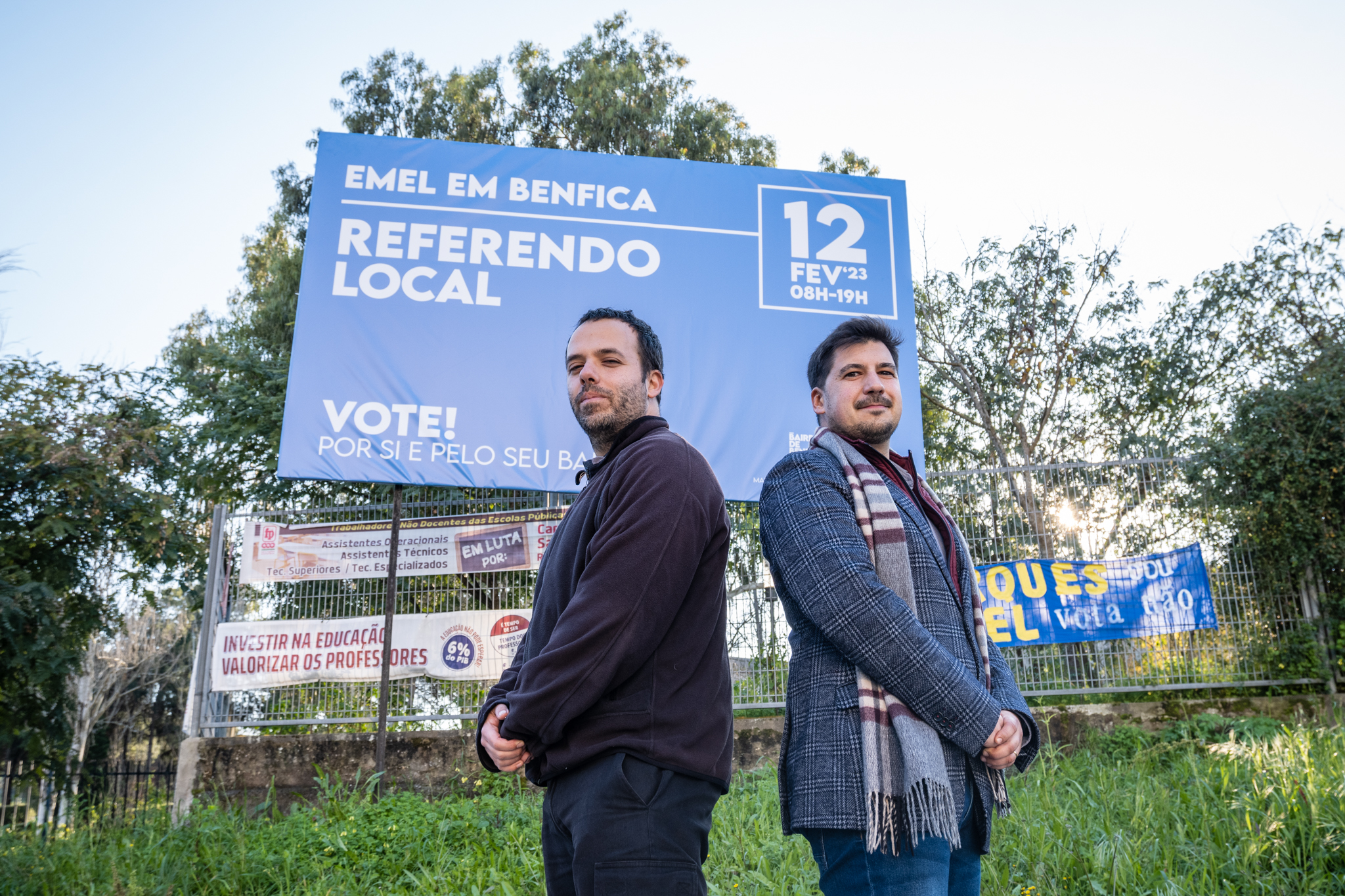
Rui Simão argues that the parish of Benfica should now have parking organized and charged by EMEL. Already José Antunes thinks the opposite. The two have many points of disagreement, but agree, for example, that the parking supply in Benfica is insufficient. On the eve of the first ever local referendum in Lisbon, we talked to both sides of the issue that is dividing Benfica: should the parish have parking regulated by EMEL? YES or NO. Rui defends the YES, José the NO.
Rui and José accepted the invitation of Lisboa Para Pessoas to debate together the future of parking in the parish where they both live. Next Sunday, February 12th, the 32 thousand Benfica voters will tell us whether they want EMEL to be regulated or not, by participating in a local referendum. On the ballot that they will have to place in the ballot box as if it were a normal election, they will find a question: "Do you agree that the Benfica Parish Council should issue a favorable opinion for the placement of parking meters in Benfica's Limited Duration Parking Zones?". The answer will have to be given with a cross in the desired square: YES or NO. At least 50% of Benfica's population must participate for the referendum to be valid.

EMEL's perceived value proposition
The conversation with Rui and José begins in Rua Nina Marques Pereira - a small internal street, adjacent to Avenida Gomes Pereira and at the back of the Baldaya Palace, which is mainly used for parking by those who live there. This is the case of a neighbor who, from his balcony, approached us when he realized what we were talking about. He said he was in favor of the NO vote and asked José for a sign to give to a shopkeeper who also does not want EMEL in the parish because, not being a resident of the parish, he would have to pay for parking his car (25/month). "This doesn't solve anything"says the resident, his name is Antonio. "I don't think YES will win, but if he does come and talk to me again to see if anything has improved." Antonio has his car parked on that street. "I hardly use it. I only use it when I go ashore." He is from Viseu, a region that in the 1980s lost its train, to António's and many other Viseu residents' sorrow.
Contrary to what the merchant said, the eventual coming of EMEL to Benfica would not mean an additional burden to António, who, because he is a resident of the parish, would be entitled to a free resident badge, being able to park in his area of residence and in an adjacent area free of charge and unlimited. Since the revision of the Lisbon Municipal Parking Regulation During the previous municipal term, with Miguel Gaspar in charge of Mobility in the city, EMEL started offering a resident permit per residential address. This means, in practice, that a family can have a car occupying a space on the public road without paying anything; however, the permit does not guarantee availability of spaces - so in areas where there is a lot of pressure (for example, because there are many dwellings without garages), demand is much higher for the available parking supply.
EMEL's Dictionary
- EMEL - created in 1995 to manage and regulate parking in Lisbon, EMEL has been broadening its scope and, more than a municipal parking company, it is now a mobility company with projects such as the GIRA shared bicycles or the LEVE electric car charging system. EMEL also manages a bicycle parking network called BICIPARK, is responsible for the construction of bike lanes in the city, for elevators and escalators to help pedestrian mobility, and is rethinking Lisbon's five main public transportation interfaces.
- Parking - With regard to parking, EMEL manages both on-street parking spaces, organized in zones (Limited Duration Parking Zones), and in dedicated parks, which may be on the surface, underground or in silos. EMEL also manages parking and car circulation in the city's historic districts, namely in Alfama, Bica, Castelo and Bairro Alto - in these districts there are the so-called Conditional Access Zones (ZAAC), which can only be accessed by car by residents, shopkeepers and essential services.
- Limited Duration Parking Zone (ZEDL) - The entire territory of the city of Lisbon was divided into zones, called Limited Duration Parking Zones (ZEDL). Although the ZEDLs for the entire city have already been defined, their launching (i.e., EMEL's EMEL always depends on a "favorable opinion from the competent Parish Councils", according to the Council's General Regulation for Parking and Stopping on Public Streets (RGEPVP) for the city of Lisbon.
- Daily parking and bollards - EMEL has Daily Ticket zones in some parts of the city, where it is possible to park all day long for a fixed fee of €2 or €3. These Daily Ticket Zones are, as a rule, in areas where there are no residences and where parking demand is limited, having a deterrent function. There are also deterrent parks in the city - for example, in Ameixoeira, at Lisbon's doorstep, there are 500 parking spaces available for an extra 10 €/month for pass holders. Here, too, there are daily rates for occasional use.
- Organization of parking and reservation of parking spaces for residents - EMEL that there is a rearrangement and marking of parking spaces on the public road, with the concern to free crosswalks and other critical areas. Generally, parking is also created for motorcycles (which is free for everyone) and for bicycles (also free). On the other hand, EMEL creates exclusive parking areas for residents, reserving squares or parts of streets.
- Resident Badge - EMEL provides a maximum of three resident permits per household. Free Resident Badgewhich allows them to park a vehicle in two zones, the one where the residence is located and a second adjoining zone of their choice. Each address can have up to three permits: the first is free, the second costs €54/year, and the third €132/year. Owners of electric cars are entitled to a Free Green BadgeThis is valid for the entire city.
- Informal caregivers and large families - The Informal Caregiver Pass allows informal caregivers to park free of charge for three hours a day in the home area of the person they are caring for or in an area adjacent to the school, including in exclusive parking spots for residents. The Large Family Pass is for families with at least three minors in the household (one of whom must be under the age of two) and allows them to reserve an exclusive parking space for the family at their doorstep.
- Company sign - merchants and other entrepreneurs can ask for a Company Label at a monthly cost of 25 euros. This permit allows you to park on the streets belonging to the zone of the respective headquarters or commercial establishment.
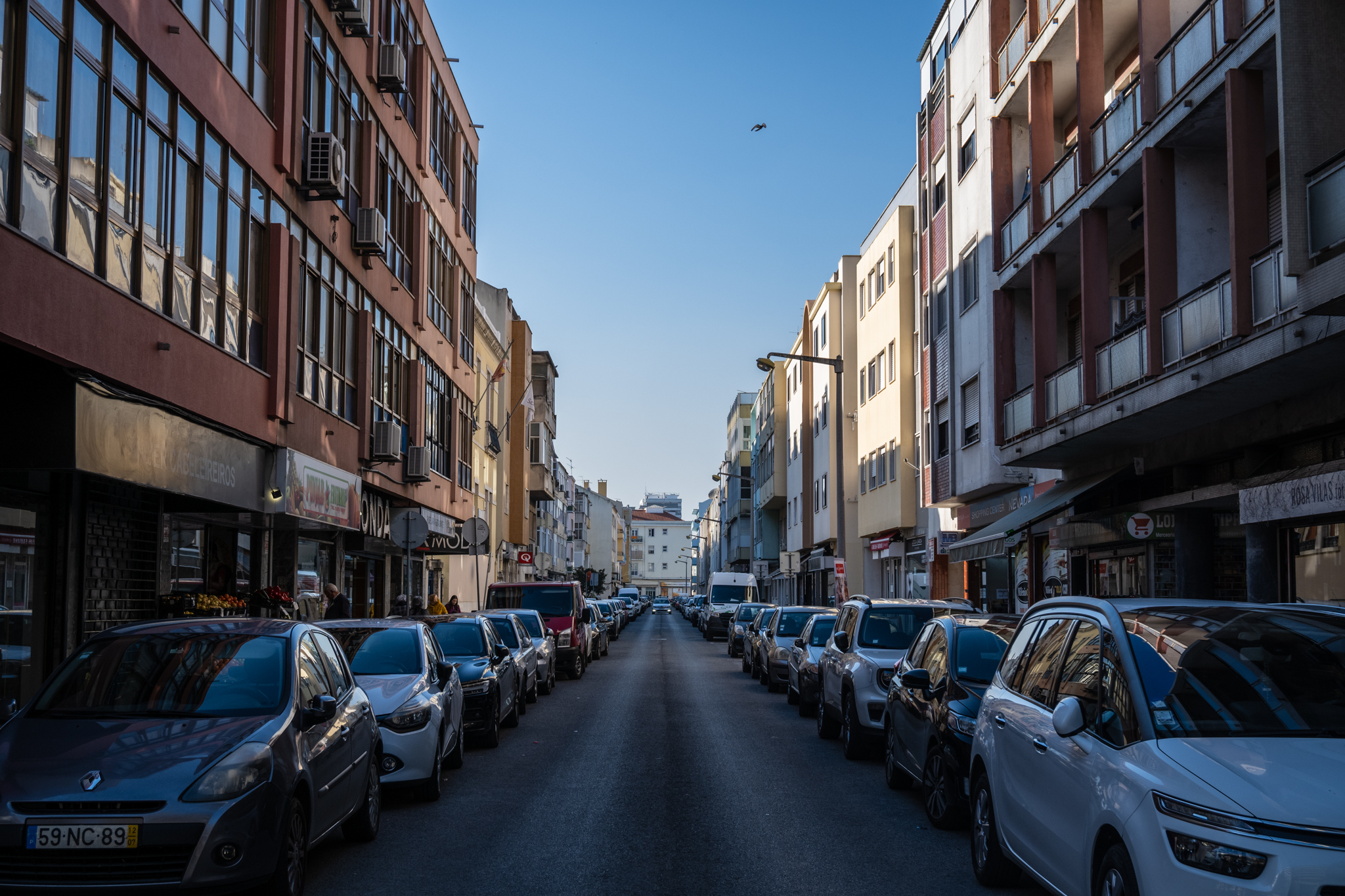
Lacking parking? Or rotation?
Not guaranteeing a seat is one of the arguments of Jose and the NO campaign. "EMEL has been systematically pitched by the municipal political establishment as a solution to parking issues, but EMEL is not only not a solution, it is part of the parking problem."understands the opponent. "There is a shortage of on-street parking space for the residents themselves. So we're looking at the problem from the wrong side." Even if EMEL creates parking spaces only for Benfica residents, as it has done in other parts of the city as it expands its area of operation, José says "that's no good because the space is not enough for the residents themselves". "In addition, you are excluding other possible valences that the space can have. Sometimes areas are not exclusively residential, they also have commerce and services. They are mixed. And that [restricting parking to residents] is a limitation on mobility, it promotes immobility."
"It doesn't bother me at all that someone comes and parks during the day in an area where I am not then. It doesn't bother me at all. Are we going to put a wall at the entrance of our parish to prevent trespassers from coming here by car?"
- José Antunes, NO
José cannot see any advantages in having EMEL over the current situation, since the supply of spaces will not change with the eventual presence of EMEL, and that at night, when residents need parking the most, the company does not operate (surface parking pricing ends at 7 p.m. and resumes at 9 a.m. the next day on weekdays; there is no EMEL on weekends and holidays either). "It doesn't bother me at all that someone comes and parks during the day in an area where I am not then. It doesn't bother me at all. Are we going to put a wall at the entrance of our parish to prevent trespassers from coming here by car?"he asks. José agrees with charging in historical and high-demand areas, such as Avenidas Novas, where most surface parking is regulated by the Red Fare - EMEL's third most expensive fare (1.60 euros/hour, maximum two hours). Benfica will be covered by the Green Fare, which allows parking for a maximum of four hours, for just 80 cents per hour. The purpose of these rates is to promote turnover.
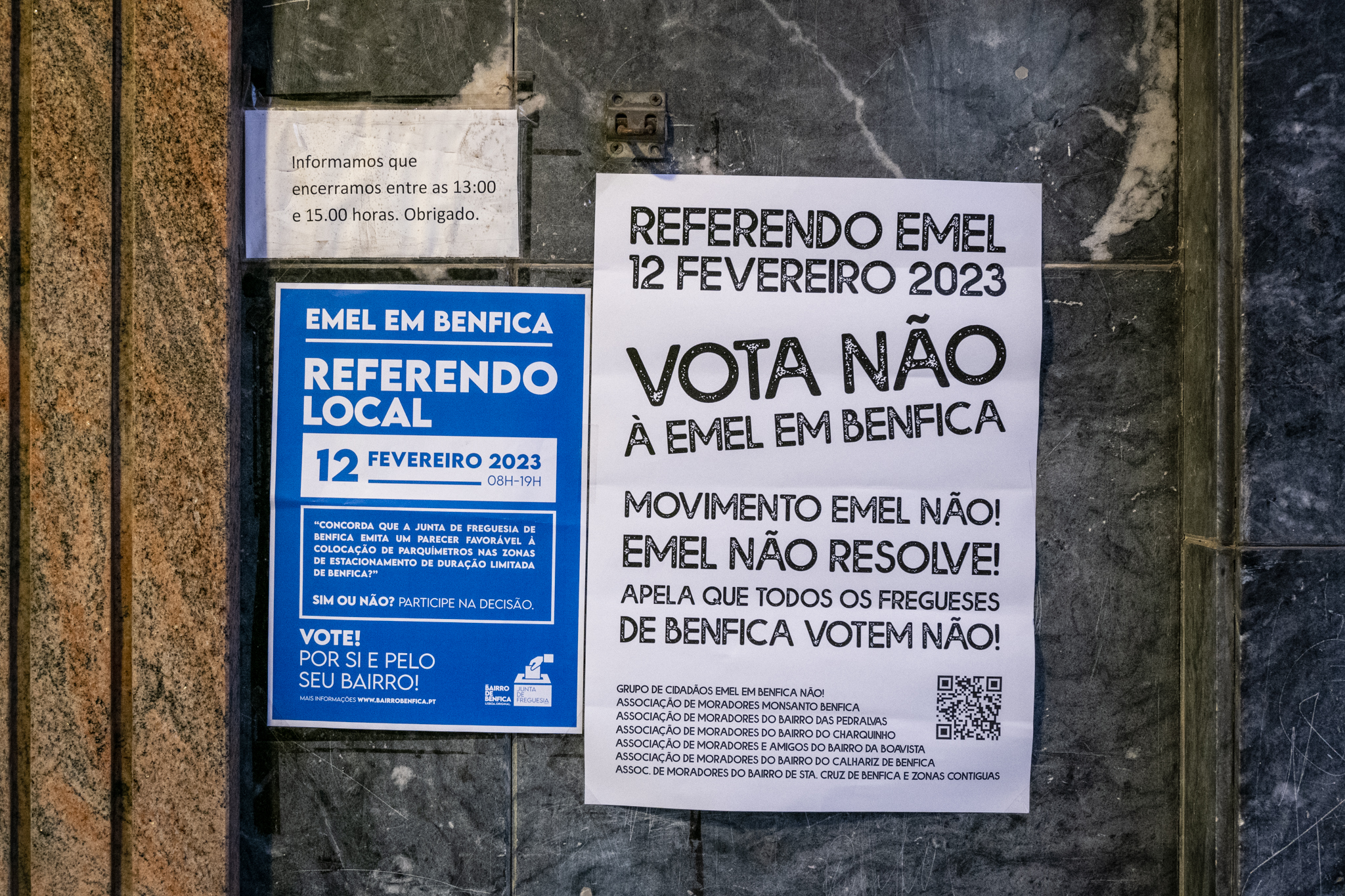
"There are various reasons why people may come to our parish, including visiting family, friends, even situations of needing to provide support, which is not even necessarily the issue of the informal caregiver. But even the informal caregiver is also limited to the timer with EMEL, since they have a time limitation to be able to park."José points out (the Informal Carer Pass allows informal carers to park free of charge for three hours a day in the home area of the person they are caring for or in an area adjacent to the school, including in resident-only spots). But for Jose and the NO, the central issue is the perception of EMEL's value proposition: "As I said, EMEL does not respond to parking problems."
"EMEL is unresponsive to parking problems."
- José Antunes, NO
At the end of our conversation with José and Rui, several questions remained unanswered. If, on the one hand, it was difficult to explain the advantages of having charged parking in a particularly residential area, from where people leave in the morning to go to work and return at the end of the day, when EMEL is no longer active, on the other hand, it is difficult to position the no regulation scenario as preferable to the existence of regulation during the day, allowing an eventual greater rotation of spaces for those who need to commute to the parish. In the end, EMEL's value proposition seems insufficient for some people. Still, if José insists that, even without EMEL, there are parking spaces available during the daytime, Rui Simão would like to see parking charges providing rotation.
"Imagine I have a lunch appointment with you at a sushi place in Alvalade. I can go by car counting only on the arrival time. Whereas if we schedule a lunch here in Benfica and you come by car from your house, you can't count only on the arrival time. You have to count the time of arrival and the time you will spend looking for a parking lot.Rui points out. "In Alvalade there is turnover. The cars are there but they're not there indefinitely, especially the ones that don't belong to residents. So there is rotation. Here everything is stagnant, everything is stopped in the same place."
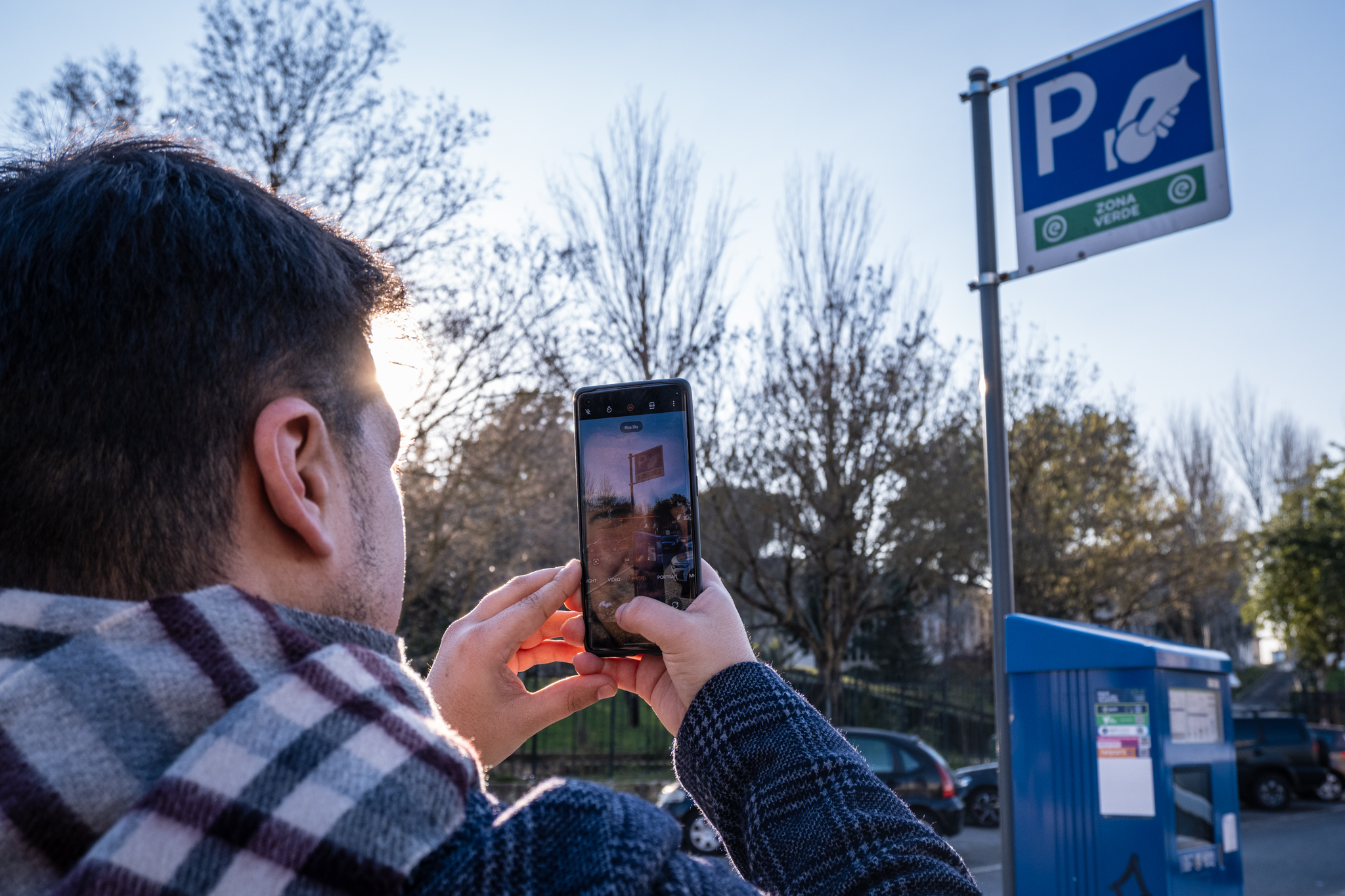
Mobility? Or immobility?
The YES spokesman points out that "The fact that EMEL works until 7pm will already force a rotation. In other words, the cars that are parked for days on end in the same place will no longer stay if they don't belong to residents. So EMEL will help vacate some spaces for the night. But even if it didn't help at all at night, I would still vote YES because at least during the day it would solve the problem“.
"The fact that EMEL operates until 7 p.m. will already force rotation. That is, cars that are parked for days on end in the same place will stop staying if they don't belong to residents."
- Rui Simão, YES
For Rui, the experience with EMEL is positive for his trips to other parts of the city. "When I want to go with my five-month-old son to the vaccinations there in Sete Rios, I could go by train, it's true, but I go by car to go with him comfortably. Since there is EMEL, I always park outside the health center, it has never failed. I get there and I have a spot. I turn on the app, I pay one euro but I have a spot."he says. Despite the rotation, it is common to see the city streets overloaded with cars, and situations of second row or parking on sidewalks, even in areas already charged and regulated by EMEL. It can be said that Lisbon has an enforcement problem that not even the presence of EMEL can solve. "If you go to Church Avenue, you see a lot of second-row parking, even though it's an area with EMEL and Red Fare. That happens because you have a limitation of space, which is historic and insufficient for the residents themselves."contrasts José. "That parking rotation doesn't exist to a large extent because the residents themselves fill the existing space."
"Should parking be created? Yes it should, I say yes to that right now. Where do I sign? That's not the issue on the table here."
- Rui Simão, YES
"Should parking be created? Yes it should, I say yes to that right now. Where do I sign?"says Rui. "The question on the table here is not that. The question in the referendum is not about being created parking, because if it was we would both vote yes. We were in agreement. The question is whether or not Benfica wants charged parking. There is no alternative to not having EMEL. It's not by voting NO that there will be more spaces.he contests. "I would say that EMEL is a little bit to parking what the police are to crime. It doesn't stop crime, but we don't want to live in a world without police. We want a civilized world where there are rules to abide by."
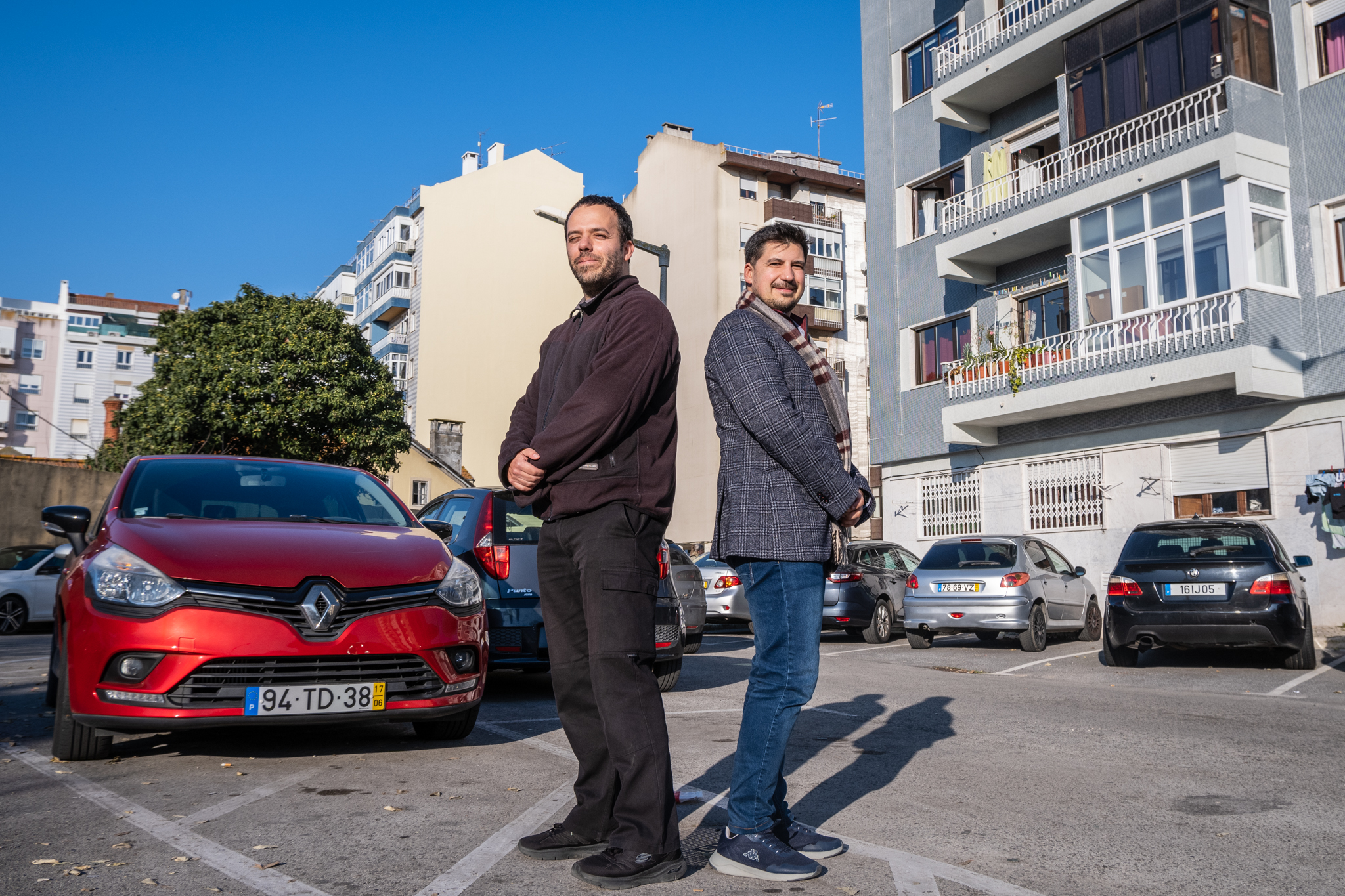
Informal Parking
The conversation, which began on Rua Nina Marques Pereira, in an area not charged by EMEL, continued towards the Fonte Nova area, where there has been regulation since 2019. We stop near the José Gomes Ferreira High School; here Rui shows a vacant lot that was transformed into a small park with capacity for about two dozen vehicles with the introduction of EMEL. "This park didn't exist, this here was irregular parking. You see, a lot of people live here in this area, there are very tall buildings, commerce is still going on... In fact, this is quite a lively area"argues Rui. In Benfica, nine regulated parking zones are planned, of which only two are in operation: zone 9F, around Fonte Nova, where we are, and zone 9C, adjacent to the first and near the Military College. These are two contiguous zones that, for Rui, exemplify the mobility paradigm that he would like to have at his doorstep. "I'm only in this [the YES campaign] because I live in an unregulated area. It's not about any party. It's not about anything but living in an area, having a kid and driving around the neighborhood to get parking, get my kid out of the car, some groceries, etc.", points out.

José points out that the small park on a former vacant lot "It was already an informal parking space. It simply might not have had the stripes on the ground there, some signs and a parking meter, but it was already a parking space.". In other words, EMEL has not responded to an effective increase in supply. And remember: "The City Council has powers in creating parking lots, just as the Boards can create parking pockets. There doesn't need to be EMEL." In fact, just recently the Benfica Council opened a park with a hundred spaces next to the Benfica Market, requalifying a pre-existing vacant lot. Rui contests the informal parking spaces: "Those lots were not parking lots. They were unmarked, unmarked, unmarked lots where people parked indiscriminately. And one day, a blind person could run into a car in the middle of the road. Today, they are marked places, so a blind person knows where to pass. So, they are created places. José says that informal parking already existed. There is no informal parking: there is regular or irregular parking. All parking is one of these two things. And so, when EMEL intervenes, it normalizes and sees if there are conditions to create parking or not. That is, if there aren't minimum spaces for cars to be in harmony with pedestrians, it can't create spaces."
"There is no informal parking: there is regular or irregular parking. When EMEL intervenes, it normalizes and sees if there are conditions to create parking or not. If there are no minimum spaces so that cars can be in harmony with pedestrians, you can't create spaces..."
- Rui Simão, YES
Rui risks a comparison: "Unregulated parking is the shanties of the 1990s in Lisbon. Now, what is needed is clear. People lived in shacks because they had no other conditions; they also park on the sidewalk because they have no more space. It's up to the municipal public company EMEL, the city council and the parish council to create the parking conditions, to regulate that parking, just as those people were taken out of the shacks and put into houses, now the same investment should also be made and conditions created here to make things work."
Bottom, "There is little parking in Benfica. Are we going to continue the same or are we going to regulate. I advocate that we should regulate".he summarizes. There is an important detail in Rui's message and in the YES campaign: "I'm not arguing that the whole parish should be charged. What we should do is to start a process of verification of the areas that may or may not be charged. There are areas, like the Boavista neighborhood, where it doesn't make sense to have charging".mentions. "If the NO wins the entire parish loses the possibility of starting a process to implement charging. That process must be evaluated on a street-by-street basis. It has to be seen where it makes sense to implement." The Boavista neighborhood is also a concern for the NO: "In the zoning proposed by EMEL for Benfica, the Boavista neighborhood is isolated. This is already a peripheral neighborhood, with much fewer facilities than the rest of the parish, whether in public facilities or in commerce"José points out.
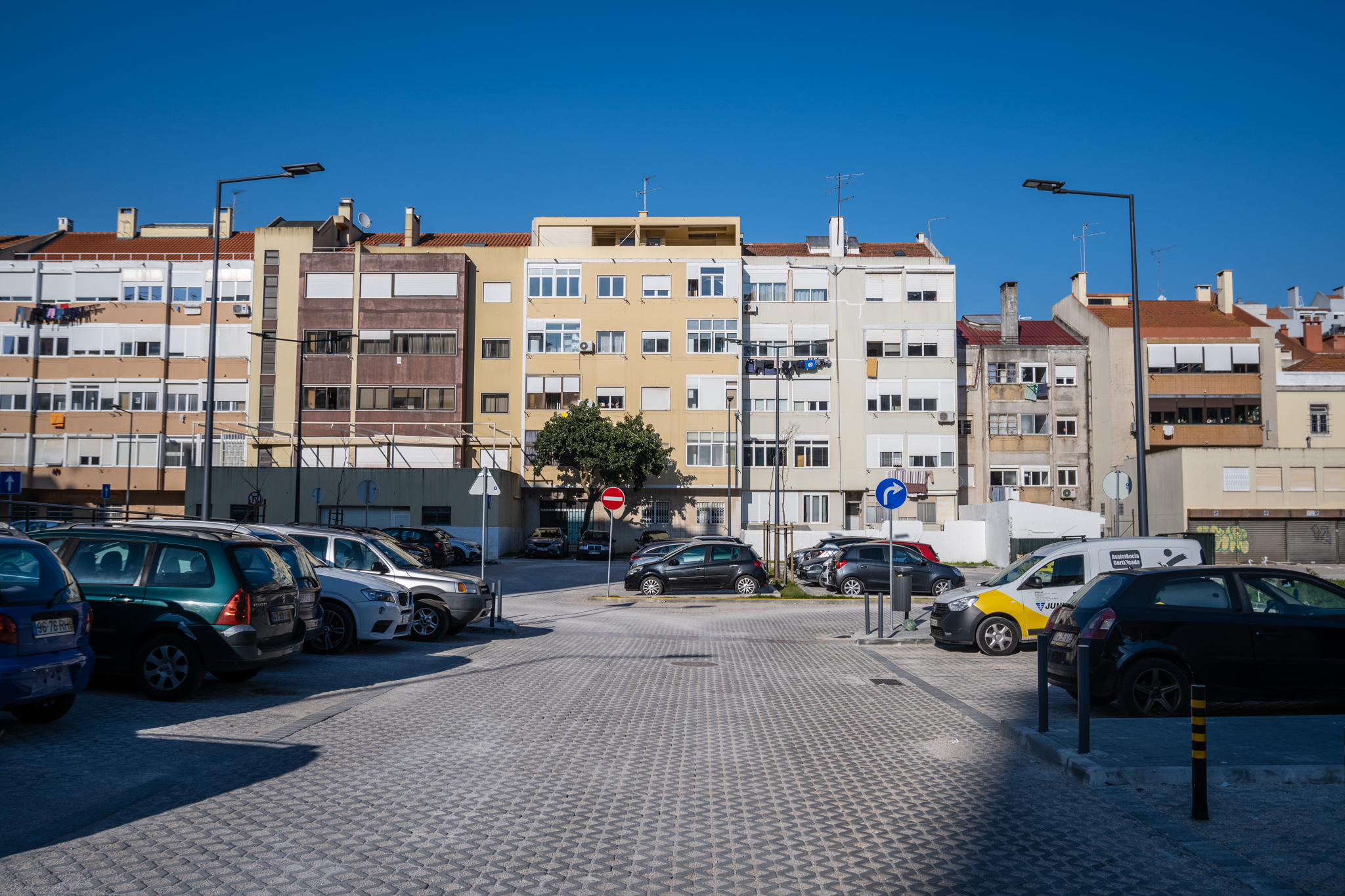
Regular or not regular, that is the question
We arrived at the Fonte Nova Shopping Center. The exchange of ideas and arguments between José and Rui continued at a table inside the shopping center, which saw its surroundings redeveloped in 2018 under the program A Square in Every NeighborhoodA new pedestrian and parking plaza has been created and the car parking under the 2ª Circular viaduct has been reorganized. "The intervention resulted in a drastic decrease in the area allocated for parking and didn't even materialize in a green space. It's a space of stone and concrete, run from one end to the other. I don't see the point of it as a public space.exemplifies the EMEL opponent. Supported by some notes on their cell phones, the NO and YES representatives answer more questions and provocations posed by us, trying to clarify their points of view.
"There is too little parking in Benfica. Are we going to stay the same or are we going to regulate. I argue that we should regulate."
- Rui Simão, YES
For Rui Simão, the presence of EMEL in Benfica is a question of inclusion. "If we want an integrated parish in the city, we cannot be excluded from the mobility policies that, for better or worse, for almost 30 years have included EMEL", points out. "Likewise it doesn't make sense to have public transportation that only runs within Benfica - for example, a train that starts there at Portas de Benfica and ends at Fonte Nova." For the YES supporter in the referendum, this is still a question of consistency. "We, as Lisboners, are already all EMEL taxpayers because I, when I go to other places, for example, to Alvalade, I have to pay a parking meter. And I pay because I know it's a logical thing to do. But, in my area, I'm not protected because I don't have the right to a Resident Permit since EMEL isn't working here."
If Rui Simão and José Antunes agree that parking is lacking in the parish, for the NO campaigner EMEL is part of the problem: "The pressure created by parking here in this Fonte Nova area, which eventually led to the implementation of parking meters because of pressure from residents, was caused by EMEL itself, when it started charging for parking in the parish next door"says the defender of the NO. "Of course there is a shift of cars from one place to another, and that aggravates parking in the border areas. So EMEL is pushing the problem with its belly until we're all with priced parking and we all continue to have parking problems."
José has no doubt that the parking issue is a "urbanism problem". "We've had rampant construction in the last few decades in Benfica, this has gone from an area of farms to a concrete forest, and you have a number of developments built high with seven, eight stories, no garage. Of course we have a problem here - we have a limited public space that has to hold other uses besides parking." In Japan, for example, in the process of buying a car, the potential customer has to prove that he has a garage or parking space for it. That's why, for example, we don't see Japanese streets full of cars in the photographs we like to admire so much. In Portugal, and in the particular case of Lisbon, there is no consequence in the act of buying a car and "it is very easy to find a two-car apartment in Benfica"as José recognizes. The President of the Benfica Borough Council, Ricardo Marques, even admitted there was a ratio of 2.6 cars per house on Cláudio Nunes Street, generating enormous pressure on public space.
"We've had rampant construction in the last few decades in Benfica, this has gone from an area of farms to a concrete forest, and you have a number of developments built high with seven, eight stories, no garage. Of course we have a problem here - we have a limited public space that has to hold other uses besides parking."
- José Antunes, NO
Parking tickets and prices
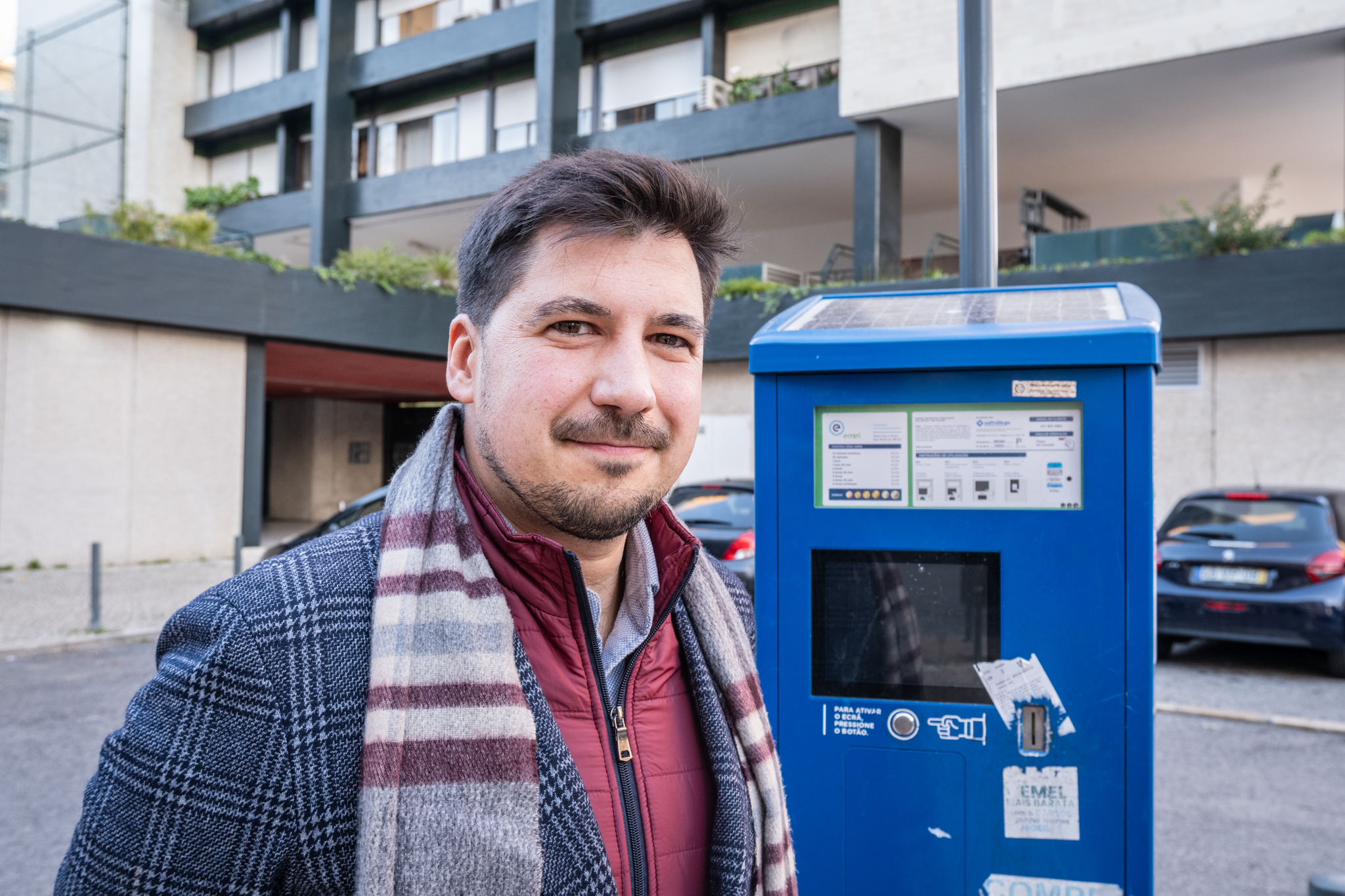
"Obviously, having a Resident Permit is no guarantee of parking at the door. That's not what it's about. Having Dístico is an advantage so that I can have a car in the area of my residence without being limited in time."Rui explains. He adds: "Parking shortages affect people in proportion to the amount of time they spend in a given place. And residents are the ones who spend the most time in places in the first place. They are the ones who need parking the most The others come visiting and pick up the turnover of spaces. Does it make sense? I think it does. What doesn't make sense is that Benfica, if the referendum result is NO, will be a parish with no parking fees and no benefit for residents. Because that's what's at stake if the NO wins." For Rui, parking regulation is something commonplace, which exists in other cities in the country, even in smaller towns.
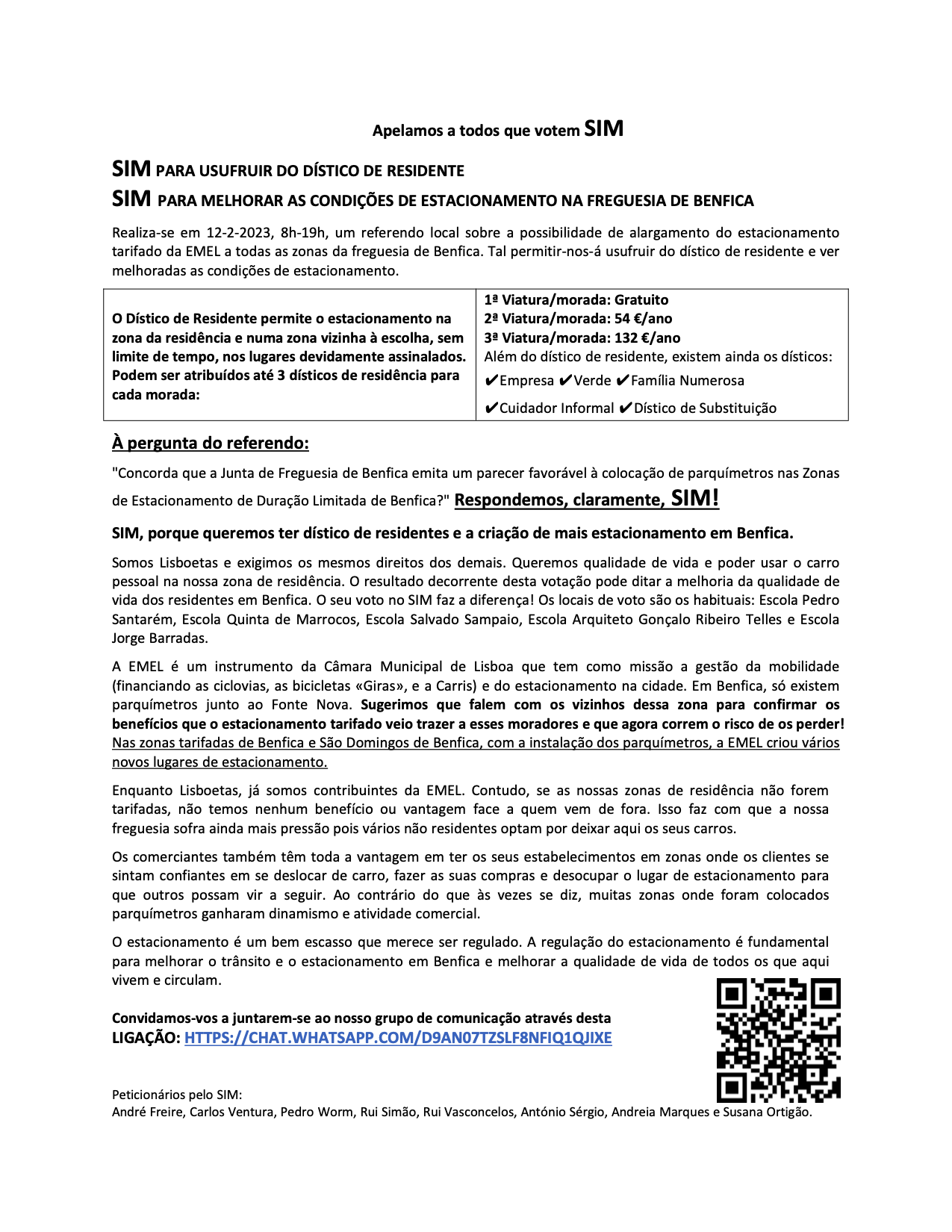
"By the way, there is a black market of irregular rental of garages, without receipts or in substandard places"he denounces. "There are people who, desperate because they can't get a place, are forced to turn to that market. And right now, in Benfica, even if you want to rent a garage without receipts, without anything, you can't get it in certain areas because everything is occupied."
Parking in Lisbon is one of the cheapest by comparison with other capitals. In Paris, for example, the surface charge varies between 4 and 6 euros, and resident rentals can cost more than 40 euros a month (or more than 520 euros annually). In other cities, residents almost always have to pay for their permit; and there is a trend to migrate surface parking to underground or silo solutions. In Lisbon, the Dístico de Residente (Resident Permit) will, in 2019, with the revision of the municipal parking regulations, cost 12 euros per year to zero. EMEL assigns a maximum of threeísticos per dwellingThe second costs 54 euros per year and the third 132 euros - and even if you have a garage, you can park on the public highway. If a family has an electric car, they have a Green Labelwhich is free and allows unlimited parking anywhere in the city (on public roads) - and this Green Card can be cumulated with the Resident Cards. Families with at least three minors in the household (one of whom must be under two years old) can apply for a Numerous Family Badgewhich gives access to an exclusive, free place close to home.
"For example, shouldn't it be possible for people to have their cars on the public road for free if they have a garage at home? Those are things that public policy can do. In other words, I'm going to be paying close attention in the next election to the politicians' agenda on mobility in the city."Rui points out, admitting that EMEL may have another operating model, without going into concrete details in this area. "At that point, we can then vote on the best agenda for mobility. There may be someone who then proposes that instead of three cars on the public road, the mayoral candidate proposes that they go to two, or that they go to five. The population there, sovereignly, will elect the best agenda for the city." Right now, the focus of Rui and his campaign is on this local referendum, which will be held because "policy makers did not want to make a decision". "They have resigned from this discussion because they know that this is a discussion that, taking one side or the other of the coin, always causes them to lose votes", understands.
Referendum has the right question?
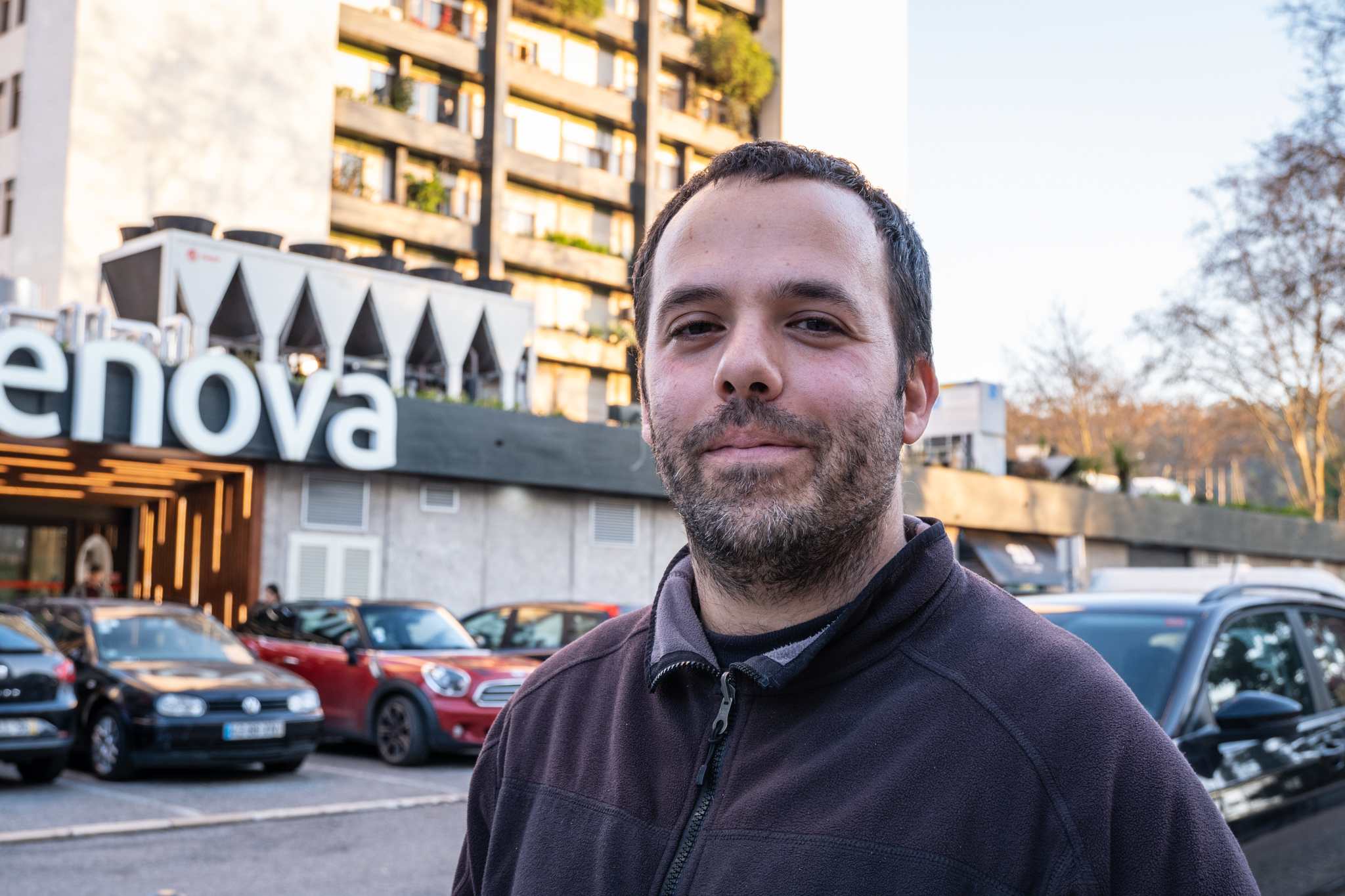
José doesn't get into this debate, but he opens another one. The referendum question, in his view, is not about whether the parishioners want parking meters or not in the parish. It is about whether the parish council should give a favorable or unfavorable opinion to the zoning (to the so called division of the parish in nine parking zones) proposed by EMEL and approved last year by the Lisbon City Council. "It follows from this that there is a legal consequence only. What people are being asked about is the direction of the opinion being sought from the Board - whether favorable or not favorable."he points out. In fact, although EMEL's operating zones have already been defined for the entire city of Lisbon, EMEL can only activate them with a favorable opinion from the competent parish councils. And it is this opinion that, technically, is on the table in this referendum. "I know that all of this has been approved by the Constitutional Court, but it still causes some disquiet, some doubt about the real impact, from a legal point of view, that this referendum might have."
In other words, what may be a technical issue may gain a greater symbolic dimension. "People can say in the referendum what they want for the parish, whether or not they want EMEL to regulate parking here by issuing that opinion or not. And that has a political message. The political power will not dare to go against what the majority expresses in this vote. But in my view, the power of decision is not really being delegated over the citizens, it's still in the hands of those who have that power."
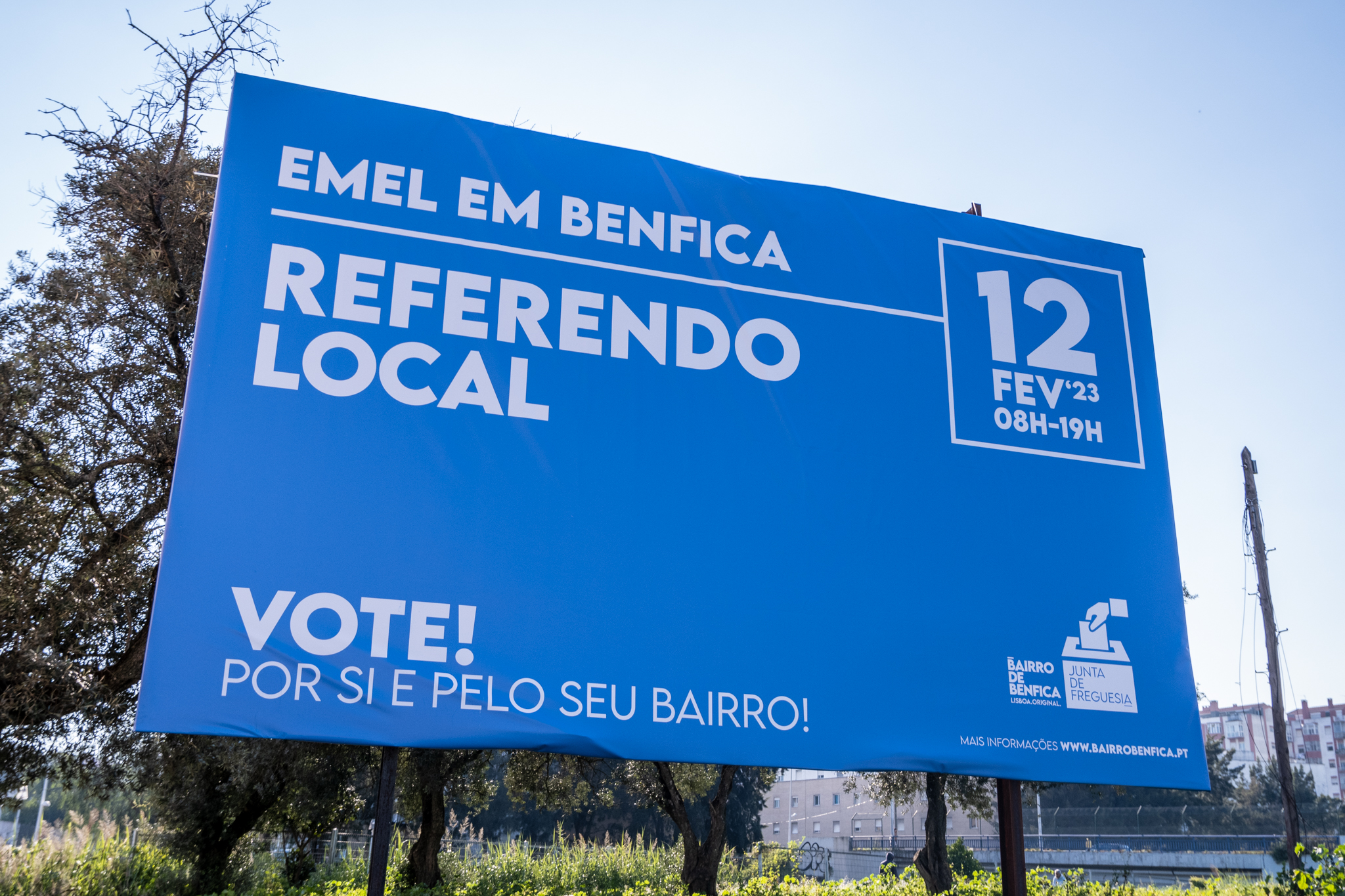
What about modal transition?
But for José, EMEL is still a "a form of covert taxation". Rui disagrees: "Effectively, EMEL has an economic reason, and it has to, because otherwise it is the taxpayers who pay for the public investment in GIRA, in the bike paths, in Carris. And one of two ways, either you go to people's taxes directly to make these investments, or you're going to tax, charge those who actually make a use of the car, a use that within the regulated is legal." And in the modal transition that is intended to be stimulated, it makes sense to Rui that EMEL's revenues from car parking should help the city's investments in other more sustainable modes of mobility. "EMEL has already evolved to not just be a company that charges for parking. It is a mobility company".Benfica does not yet have EMEL's new electric vehicle charging system, launched in 2021 under the LEVE brand. "We don't have these chargers in the parish because we don't have EMEL. We only have two stations from another entity. It's not acceptable for a parish that's bigger than some counties in the country."
"With means of transportation that truly provide an alternative to the use of the car, I think people will opt for that transportation. But I think incentives should be created for the positive. The car is quite an expense."
- José Antunes, NO
Jose also tracks modal transition needs and says, "with modes of transportation that truly provide an alternative to car use, I think people will opt for that transportation". "But I think incentives should be created for the positive. The car is quite an expense. Still, not only because of the circumstances of life, but because of the travel times in comparison, people will opt for the car or not. For example, I once had to go to Loures, and if I had to do that trip by car, it would take 15 minutes each way. I did the trip by transportation, it involved changing transports, I had to take three transports, in this case, buses. And it took me almost two hours."
The local referendum in Benfica will take place on February 12th on usual polling places in that parish: the schools Pedro Santarém, Quinta de Marrocos, Salvador Sampaio, Arquitecto Gonçalo Ribeiro Telles, and Jorge Barradas. The ballot boxes will be available between 8 am and 7 pm, and voters will be divided into the usual polling stations.
You can follow the NO campaign on this Facebook pagethe YES campaign is also on Facebook e still on WhatsApp.

